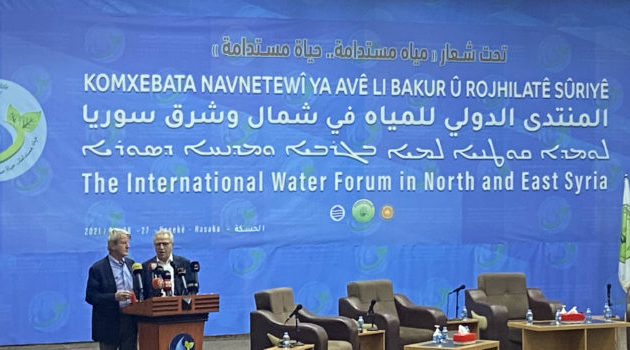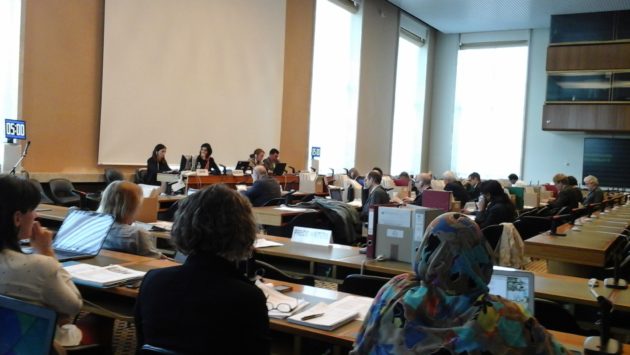Save Tigris Campaign Releases Open Letter to Andritz: Disastrous Impacts of Ilisu Dam for Iraq
To: Mr Wolfgang Leitner, Andritz’s President and CEO
From: Save the Tigris Campaign Coalition
We are a group of Iraqi civil society organizations that are deeply concerned about the future of our nation’s water resources and the impact the Ilisu dam would have on them if completed. We write to inform you of the dramatic social, environmental and economic consequences of your company’s actions and to urge you to divest yourself from this project. Iraq has already suffered a decline in water flows on the Euphrates River because of the GAP Project in Turkey; the water quality of the Euphrates within Iraq has deteriorated because its volume has been reduced by other dam projects. Total Dissolved Solids in the Euphrates have quadrupled, making the water unsuitable for human consumption and causing problems for most major crops, which cannot stand the increased soil salinity.[i]
Ilisu would further reduce Iraq’s water supply in the Tigris River causing devastating effects on agriculture and water supply. If the Ilisu Dam project goes forward it will violate Iraqi’s human right to water as articulated under the International Covenant on Economic, Social and Cultural Rights[ii] which has been ratified by both Turkey and Austria. The UN Convention on the Law of the Non-navigational Uses of International Watercourses from 1997,[iii] which is widely viewed as a codification of customary international law and reflects a general mandate to all states embodies the obligation of equitable and reasonable utilization of water resources, prevention of significant harm, and prior notification of planned measures, none of which Turkey has complied with to date.
Iraqi water reservoirs, including Tharthaar, between the Tigris and the Euphrates, and Habbaniyah, west of the Euphrates, will be diminished by Ilisu. Further downstream, the marshlands of southern Iraq are also in danger.[iv] They are home to the Marsh Arabs and have global significance for their biodiversity and more than 5,000 years of history. They are home of numerous bird, mammal, amphibian and reptile species, many of which are globally threatened.[v] The marshlands support fishery resources, which account for 60% of Iraq’s fish catch and that have shown a 50% decline due to extensive upstream damming and water diversion projects.[vi] In the past, extensive ecological damage to the area and the displacement of much of its indigenous population was identified by the United Nations Environment Programme as “one of the country’s major environmental and humanitarian disasters”.[vii] The marshlands’ restoration require adequate quantities of water properly managed, yet the Ilisu Dam threatens this process and will lead to further droughts that will result in habitat loss, wildlife decline and extinction, population migration, community unemployment and will violate the rights of thousands of indigenous Marsh Arabs as expressed in the UN Declaration of the Rights of Indigenous People Article 8, 20 and 26.[viii]
In 2007, Hawizeh Marsh (Haur Al-Hawizeh), which receives the majority of its water from the Tigris, was the first marsh in Iraq to be listed on the Ramsar List of Wetlands of International Importance.[ix],[x] The Central Marshes are currently being considered for UNESCO World Heritage Status and for National Park status. This valuable, unique, irreplaceable part of the world will likely be lost forever if the Ilisu Dam is completed. We demand that Andritz abide by its Code of Business Conduct and Ethics, expressly its sections describing compliance with laws, regulations and customs, environmental protection and sustainability.[xi]Andritz must respect international law and suspend its work in this dam immediately until an independent study can be conducted on its social, economical and environmental consequences. Part of this study, in accordance with environmental impact assessments around the world, should be dedicated to analyzing how to minimize the impact of the dam to the Iraqi people.
We urge you also to start working with the Turkish government to re-initiate dialogue with riparian states that will ensure an equitable sharing of the waters of the Tigris. Finally, we demand that further studies be conducted on how to minimize the impact of the dam on the Iraqi people. We are determined to use international treaties and protocols, the media and other advocacy resources to protect our right to water and to preserve our cultural and natural heritage. Failure to abide to your code of conduct and to international law would damage your image and affect your ability to conduct business in the future in Iraq.
Save the Tigris and Iraqi Marshes Coalition
1. Iraqi Peoples Campaign to Save the Tigris, Iraq
2. Civil Development Organization, Iraq
3. Nature Iraq, Iraq
4. Iraqi Civil Society Solidarity Initiative, Iraq
5. Initiative to Keep Hasankeyf Alive, Turkey
6. Corner House, UK
7. Counter Current, Germany
8. Un Ponte Per, Italy



